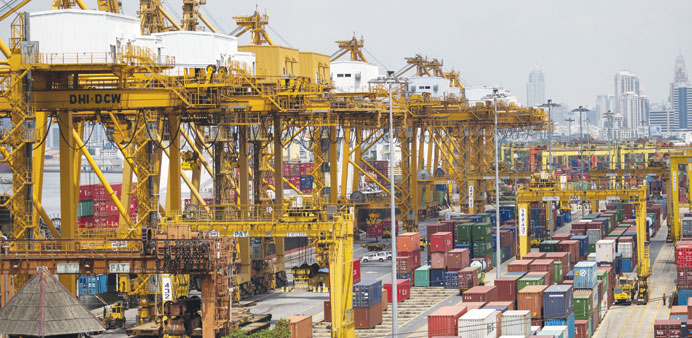Shipping containers are seen at a port in Bangkok. Thai factory output unexpectedly rose in February from a year earlier, ending a 22-month streak of falls and giving some hope of improvement in the beleaguered economy.
Reuters/Bangkok
A 22-month streak of declining Thai factory output has ended, lifting hopes for an economic recovery, but a member of the country’s monetary policy committee warned that the traditional growth drivers are “not really working anymore”.
Yesterday, the government reported two encouraging pieces of data about the economy, which has long struggled to gain some traction and grew only 0.7% last year.
The Industry Ministry said factory output in Southeast Asia’s second-largest economy in February rose 3.55% from a year earlier, the first increase since March 2013. A Reuters poll expected a 23rd straight month of contraction.
Also, the Finance Ministry said the number of tourist arrivals in February was 2.69mn, 29.6% more than a year earlier. January’s number rose 16.3%.
Despite the positive data, Sethaput Suthiwart-Narueput, one of seven members of Thailand’s monetary policy committee, sounded a note of caution. Thai growth will depend on private investment, and much of the private sector “is in wait-and-see mode”, he said.
“The weakening economy reflects that the usual economic drivers are not really working anymore. We can’t expect much from our usual private consumption at all,” said Sethaput, one of four committee members not from the Bank of Thailand.
Today, the central bank will report its investment and consumption indexes for February.
Ten months after the army seized power to end political turmoil, the military government has struggled to turn around an economy hit by both weak internal and external demand.
Imports rose 1.5% in February from a year earlier, which was encouraging because they tumbled 13.3% in January, and some imports go into products later exported.
But annual exports in February were down 6.14%, showing that this growth engine – weak since 2013 – is still not firing well.
Thailand is an export hub for global automakers, and car production increased for a second straight month in February, following a 19-month decline. The Industry Ministry said forecast that industrial output, down 4.6% last year, could increase 3-4% in 2015. Somsak Jantararoungtong, an official, said he was “confident that there will be a clear recovery”.
Benjamin Shatil, economist with JP Morgan in Singapore, welcomed the February output data but said that “sustained improvement in growth momentum will depend on how effectively the government can implement fiscal stimulus”.
Exports contracted in 2013 and 2014, and the central bank sees only 0.8% growth in shipments this year.
The central bank recently lowered its 2015 growth estimate to 3.8% from 4%.

